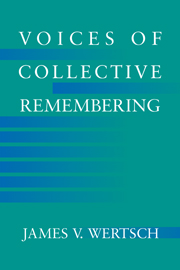Book contents
- Frontmatter
- Contents
- Introduction and Acknowledgments
- 1 An Encounter with Collective Memory
- 2 Methodological Preliminaries to the Study of Collective Remembering
- 3 Collective Memory: A Term in Search of a Meaning
- 4 State Production of Official Historical Narratives
- 5 Narrative Dialogicality and Narrative Templates in the Production of Official Collective Memory
- 6 The Consumption of Historical Narratives
- 7 Generational Differences in Collective Remembering
- Conclusion
- References
- Index
6 - The Consumption of Historical Narratives
Published online by Cambridge University Press: 08 January 2010
- Frontmatter
- Contents
- Introduction and Acknowledgments
- 1 An Encounter with Collective Memory
- 2 Methodological Preliminaries to the Study of Collective Remembering
- 3 Collective Memory: A Term in Search of a Meaning
- 4 State Production of Official Historical Narratives
- 5 Narrative Dialogicality and Narrative Templates in the Production of Official Collective Memory
- 6 The Consumption of Historical Narratives
- 7 Generational Differences in Collective Remembering
- Conclusion
- References
- Index
Summary
Up to this point, my focus has been on the production of texts about the past. I have emphasized that what is produced are cultural tools in the form of narrative texts, not collective memory itself. This bears repeating because of the tendency to assume that it is somehow possible to produce collective memory directly. Such an assumption is reflected in analyses that imply that if we know about the narrative texts produced by a collective, we know what people will think, believe, and say. In actuality, even the most exhaustive study of text production cannot tell us whether narratives will be used in the way intended by their producers. Hence, when analyzing textually mediated collective remembering, it is essential to complement studies of the textual production with studies of textual consumption.
This point takes on special importance when considering patterns of textual consumption in settings such as the former Soviet Union. At several points in earlier chapters, I have alluded to the fact that Soviet citizens often did not believe the information they obtained from history textbooks, the media, and other official sources of information about the past. Indeed, people often said they did not believe such information precisely because it was produced by the state. All this suggests that it may be quite misguided to assume that one can know what people will believe or say simply on the basis of knowing what textual resources have been made available to them.
I shall approach these issues by invoking notions such as text and narratives as cultural tools introduced in earlier chapters.
- Type
- Chapter
- Information
- Voices of Collective Remembering , pp. 117 - 148Publisher: Cambridge University PressPrint publication year: 2002



